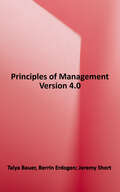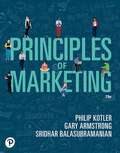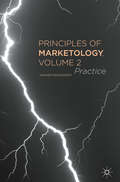- Table View
- List View
Principles of Management: Custom Edition for the University of Houston
by Chuck Williams Debra L. Nelson James Campbell Quick"This custom edition for the University of Houston is a compilation of MGMT 8 written by Chuck Williams and ORGB 4 written by Nelson & Quick. "
Principles of Management for the Hospitality Industry
by Dana V TesoneIt is vital for hospitality management students to understand key management concepts as part of the complex and intimate nature of the services industry. Principles of Management for the Hospitality Industry is designed specifically for hospitality students who need to be able to use management tools and techniques to become successful hospitality managers. By placing you at the heart of an imaginary workplace this book offers the opportunity to work through all of the items of discussion for each topic. The chapter begins with a scenario to prompt an exploration of a given topic, and concludes with the outcome of this scenario to reinforce the lessons learnt throughout the chapter. Highly practical in approach, this is an up-to-date and skilful integration of all core areas of management. It is packed with tools and techniques to aid learning and understanding: improve your professional management vocabulary with definitions in each chapter, and a complete glossary of terms visualize key concepts with over one hundred explanatory diagrams gain confidence by testing your understanding on the accompanying website practical applications of theory are illustrated in international case studies throughout the book discussion questions prompt an exploration of key concepts.
Principles of Management Version 2.0
by Mason Carpenter Talya Bauer Berrin Erdogan Jeremy ShortPrinciples of Management has been thoroughly updated, and in this edition, you’ll find a new author, a new look and feel, new content, and new as well as updated end-of-the chapter cases. One reviewer of our revision said the following about the addition of our new pages and images: “I will tell you that the addition of pictures in this edition is brilliant! I compared this text to the previous one (page by page)... the pictures truly help bring the "black and white" pages to life!”
Principles of Management Version 4.0
by Talya Bauer Berrin Erdogen Jeremy ShortPrinciples of Management covers all of the traditional topics in an introductory management course. The authors teach management principles to tomorrow's business leaders by weaving three threads through every chapter: strategy, entrepreneurship, and leadership. It is a concise, accessible, and engaging text that communicates the latest findings and best practices related to mastering the principles of management.
Principles of Managerial Economics
by Donald N. StengelEconomic principles inform good business decision making. Although economics is sometimes dismissed as a discourse of practical relevance to only a relatively small circle of academicians and policy analysts who call themselves economists, sound economic reasoning benefits any manager of a business, whether they are involved with production and operations, marketing, finance, or corporate strategy. Along with enhancing decision making, the field of economics provides a common language and framework for comprehending and communicating phenomena that occur within a business, as well as between a business and its environment. This text addresses the core of a subject commonly called managerial economics, which is the application of microeconomics to business decisions. Key relationships between price, quantity, cost, revenue, and profit for an individual firm are presented in the form of simple conceptual models. The text includes key elements from the economics of consumer demand and the economics of production. The book discusses economic motivations for expanding a business and contributions from economics for improved organization of large firms. Market price-quantity equilibrium, competitive behavior, and the role of market structure on market equilibrium and competition are addressed. Finally, the text considers market regulation in terms of the generic problems that create the need for regulation and possible remedies for those problems. Although the academic literature of managerial economics often employs abstract mathematics and large corporations create and use sophisticated mathematical models that apply economics, this book focuses on concepts, terminology, and principles, with minimal use of mathematics. The reader will gain a better understanding of why businesses and markets function as they do and how those institutions can function better.
Principles of Managerial Finance (What's New in Finance series)
by Chad Zutter Scott SmartThe Teaching and Learning System—a hallmark feature of Principles of Managerial Finance—weaves pedagogy into concepts and practice, giving students a roadmap to follow through the text and supplementary tools. <p><p>The 15th Edition concentrates on the material students need to know in order to make effective financial decisions in an increasingly competitive business environment. It allows students to make the connections between a firm’s action and its value, as determined in the financial market. With a generous amount of examples, this text is an easily accessible resource for in- and out-of-class learning.
Principles of Managerial Finance Brief, Seventh Edition
by Lawrence J. Gitman Chad J. ZutterThis seventh edition guides students through complex material with a proven learning goal system. This system - a hallmark feature of Principles of Managerial Finance, Brief -weaves pedagogy into concepts and practice, giving students a roadmap to follow through the text and supplementary tools.
Principles of Marketing
by Philip Kotler Gary ArmstrongToday’s marketing challenge is creating vibrant, interactive communities of consumers who make products and brands a part of their daily lives. Learn how to create value and gain loyal customers. Kotler/Armstrong is a comprehensive, classic principles text organized around an innovative customer-value framework. Students learn how to create customer value, target the correct market, and build customer relationships. The changing nature of consumer expectations means that marketers must learn how to build communities in addition to brand loyalty.
Principles Of Marketing
by Philip. Kotler Gary Armstrong Sridhar BalasubramanianIn a fast-changing, increasingly digital and social marketplace, it's more vital than ever for marketers to develop meaningful connections with their customers. Principles of Marketing shows you how to create vibrant, interactive communities of consumers who make products and brands an integral part of their daily lives. To help you master this key marketing challenge, the authors present the fundamentals of marketing within an innovative customer-value framework. The 19th Edition has been thoroughly revised to reflect the major trends impacting contemporary marketing. It's packed with stories illustrating how companies use new digital technologies to maximize customer engagement and shape brand conversations, experiences and communities.
Principles Of Marketing
by Philip T. Kotler Gary ArmstrongIn a fast-changing, increasingly digital and social marketplace, it's more vital than ever for marketers to develop meaningful connections with their customers. Principles of Marketing helps readers master today's key marketing challenge: to create vibrant, interactive communities of consumers who make products and brands an integral part of their daily lives. To help individuals understand how to create value and build customer relationships, Kotler and Armstrong present fundamental marketing information within an innovative customer-value framework.
Principles of Marketing
by Jeff Tanner Mary Anne RaymondThis book is intended for a two-semester course in economics taught out the social sciences or business school.
Principles of Marketing 2.0
by Mary Anne Raymond Jeff TannerPrinciples of Marketing Version 2.0 by Tanner, Raymond and Schuster teaches the experience and process of actually doing marketing - not just the vocabulary. It carries five dominant themes throughout in order to expose students to marketing in today's environment: Service dominant logic - This textbook employs the term "offering" instead of the more traditional First "P" -- product. That is because consumers don't sacrifice value when alternating between a product and a service. They are evaluating the entire experience, whether they interact with a product, a service, or a combination. So the fundamental focus is providing value throughout the value chain, whether that value chain encompasses a product, service, or both. Sustainability; Increasingly, companies are interested in the impact they are having on their local community as well as the overall environment. This is often referred to as the triple bottom line of financial, social, and environment performance. Ethics and social responsibility; Following on the sustainability notion is the broader importance of ethics and social responsibility in creating successful organizations. The authors make consistent references to ethical situations throughout chapter coverage, and end of chapter material in most chapters will encompass ethical situations. Global coverage -- Tanner, Raymond and Schuster deliberately entitled Chapter 1; What is Marketing?; Whether it is today's price of gasoline, the current U.S. presidential race, or Midwestern U.S. farming, almost every industry and company needs strong global awareness. And today's marketing professionals must understand the world in which they and their companies operate. Metrics -- Firms today have the potential to gather more information than ever before about their current and potential customers. That information gathering can be costly, but it can also be very revealing. With the potential to capture so much more detail about micro transactions, firms should now be more able to answer ;well, what this marketing strategy really worth it?; And what is the marketing ROI?; And finally, what is this customer or set of customers worth to us over their lifetime? Principles of Marketing Version 2.0 brings new and updated coverage of new developments in the influence of social media to empower consumers, as well as marketing's use of social media, such as sentiment analysis, mobile marketing, and customer service and complaint tracking, as a communications and promotion channel, just a name a few. Version 2.0 also has an overall increased number of examples, as well as, new discussion questions in every chapter (resulting in at least 10 per chapter). In addition, the textbook's key terms, and repeated concepts have been strategically arranged to make customizing this book with Flat World's MIYO platform even easier.
Principles of Marketing 2.0
by Jeff Tanner Mary Anne RaymondPrinciples of Marketing Version 2.0 by Tanner, Raymond and Schuster teaches the experience and process of actually doing marketing - not just the vocabulary. It carries five dominant themes throughout in order to expose students to marketing in today's environment: Service dominant logic - This textbook employs the term "offering" instead of the more traditional First "P" -- product. That is because consumers don't sacrifice value when alternating between a product and a service. They are evaluating the entire experience, whether they interact with a product, a service, or a combination. So the fundamental focus is providing value throughout the value chain, whether that value chain encompasses a product, service, or both. Sustainability; Increasingly, companies are interested in the impact they are having on their local community as well as the overall environment. This is often referred to as the triple bottom line of financial, social, and environment performance. Ethics and social responsibility; Following on the sustainability notion is the broader importance of ethics and social responsibility in creating successful organizations. The authors make consistent references to ethical situations throughout chapter coverage, and end of chapter material in most chapters will encompass ethical situations. Global coverage -- Tanner, Raymond and Schuster deliberately entitled Chapter 1; What is Marketing?; Whether it is today's price of gasoline, the current U.S. presidential race, or Midwestern U.S. farming, almost every industry and company needs strong global awareness. And today's marketing professionals must understand the world in which they and their companies operate. Metrics -- Firms today have the potential to gather more information than ever before about their current and potential customers. That information gathering can be costly, but it can also be very revealing. With the potential to capture so much more detail about micro transactions, firms should now be more able to answer ;well, what this marketing strategy really worth it?; And what is the marketing ROI?; And finally, what is this customer or set of customers worth to us over their lifetime? Principles of Marketing Version 2.0 brings new and updated coverage of new developments in the influence of social media to empower consumers, as well as marketing's use of social media, such as sentiment analysis, mobile marketing, and customer service and complaint tracking, as a communications and promotion channel, just a name a few. Version 2.0 also has an overall increased number of examples, as well as, new discussion questions in every chapter (resulting in at least 10 per chapter). In addition, the textbook's key terms, and repeated concepts have been strategically arranged to make customizing this book with Flat World's MIYO platform even easier.
Principles of Marketing (customized edition)
by Jeff Tanner Mary Anne RaymondThis book teaches the experience and process of actually doing marketing - not just the vocabulary. It carries five dominant themes throughout in order to expose students to marketing in today's environment. This is a customized textbook.
Principles of Marketing for a Digital Age
by Dr. Tracy L. TutenStudent-led in its design and development, the book incorporates digital marketing as central to what marketers do, and combines quality examples, assessment and online resources to support the teaching and learning of introductory marketing in a digital age. The author integrates digital and social media marketing throughout the chapters and through student involvement in the development of it, the text has been made to be approachable and to appeal to students, with infographics, numerous images, and an engaging writing style. It facilitates the &“flipped&” approach to classroom teaching and is supported by a number of features and activities in every chapter, encouraging students to undertake course reading, class participation and revision. It includes case studies from global companies such as Nutella, Google, L&’Oreal, Netflix, Airbnb, BirchBox, Uber, FitBit, Visit California and Coca-Cola. It also takes a social view of marketing, featuring cases tied to the UN&’s PRME initiative to aid students in becoming sustainably-minded individuals. The book is complemented by online instructor resources, including chapter-specific PowerPoint slides, an instructor manual, flipped classroom activities, as well as open access multiple choice questions (with solutions), videos, case studies, weblinks, a glossary and SAGE journal articles for students. To find out more and for a quick sneak peek, watch our video on the book's story.
Principles of Marketing for a Digital Age
by Tracy L. TutenWinner of the TAA 2021 Most Promising New Textbook award! This award-winning textbook introduces you to all the essential concepts and tools for marketing in a digital age. The new second edition retains a strong focus on digital and social media marketing, and has been updated to include cutting-edge coverage on the implications of Covid-19 on consumer behavior. Greater emphasis has been placed on sustainability, diversity and inclusion, providing you with the skills you will need to become an ethical and socially-minded marketer. The new edition also includes: • Over 30 case studies from global companies, including Netflix, Amazon, Zara, Tony’s Chocolonely, Nissan, and Airbnb • A revamped ‘Sustainability Spotlight’ feature in every chapter that aligns with the UN’s Principles for Responsible Management Education (PRME) initiative • A wide range of critical thinking questions that encourage you to reflect on real-world examples and scenarios. This textbook is your essential guide to marketing as part of an introductory marketing course at college or university. Principles of Management for a Digital Age is accompanied by online resources for instructors, including PowerPoints, a testbank, selected content from SAGE Business Cases and a teaching guide containing lecture objectives, chapter outlines, activities and discussion questions. Students can access additional video content and further reading for each chapter. Tracy L. Tuten is a professor of marketing at Sofia University, USA.
Principles of Marketing for a Digital Age
by Tracy L. TutenWinner of the TAA 2021 Most Promising New Textbook award! This award-winning textbook introduces you to all the essential concepts and tools for marketing in a digital age. The new second edition retains a strong focus on digital and social media marketing, and has been updated to include cutting-edge coverage on the implications of Covid-19 on consumer behavior. Greater emphasis has been placed on sustainability, diversity and inclusion, providing you with the skills you will need to become an ethical and socially-minded marketer. The new edition also includes: • Over 30 case studies from global companies, including Netflix, Amazon, Zara, Tony’s Chocolonely, Nissan, and Airbnb • A revamped ‘Sustainability Spotlight’ feature in every chapter that aligns with the UN’s Principles for Responsible Management Education (PRME) initiative • A wide range of critical thinking questions that encourage you to reflect on real-world examples and scenarios. This textbook is your essential guide to marketing as part of an introductory marketing course at college or university. Principles of Management for a Digital Age is accompanied by online resources for instructors, including PowerPoints, a testbank, selected content from SAGE Business Cases and a teaching guide containing lecture objectives, chapter outlines, activities and discussion questions. Students can access additional video content and further reading for each chapter. Tracy L. Tuten is a professor of marketing at Sofia University, USA.
Principles of Marketing (Sixteenth Edition)
by Philip Kotler Gary ArmstrongPrinciples of Marketing Is the most-trusted source for teaching and learning basic marketing concepts and practices. More than ever, the sixteenth edition introduces new marketing students to the fascinating world of modern marketing in an innovative, complete, and authoritative yet fresh, practical, and enjoyable way. In this sixteenth edition, we've once again added substantial new content and poured over every page, table, figure, fact, and example in order to keep this the best text from which to learn about and teach marketing. Enhanced by MyMarketingLab, our online homework and personalized study tool, the sixteenth edition of Principles of Marketing remains the world standard in introductory marketing education.
Principles of Marketing Version 4.0
by Jeff Tanner Mary Anne RaymondPrinciples of Marketing is an up-to-date overview of how marketing is actually done in today's world. It is a valuable resource for a first course in marketing at any level, clearly explaining effective marketing strategies and proven techniques.
Principles of Marketology, Volume 2
by Hashem AghazadehBusinesses today operate in a more complex and turbulent environment and face intense competition. To be successful, businesses must intelligently understand and deal with their changing environment and market. In this book, Hashem Aghazadeh introduces marketology as a market-related system that enables businesses to achieve competitive success through providing superior value to their key stakeholders. In this regard, the hyper-function of marketology supports business executives to make effective market-related decisions and take efficient market-related actions throughout the organization. Principles of Marketology, Volume 2: Practice concentrates on how to deploy and practice marketology architecture all over the organization. Marketology accomplishes business performance and success based on its organizational design and behavior. In this regard, marketology contributes through generation, dissemination, and exploitation of market intelligence and insight. The future of marketology is contemplated and an integrated guideline of practicing marketology is provided.
Principles of Mathematical Economics
by Shapoor ValiUnder the assumption of a basic knowledge of algebra and analysis, micro and macro economics, this self-contained and self-sufficient textbook is targeted towards upper undergraduate audiences in economics and related fields such as business, management and the applied social sciences. The basic economics core ideas and theories are exposed and developed, together with the corresponding mathematical formulations. From the basics, progress is rapidly made to sophisticated nonlinear, economic modelling and real-world problem solving. Extensive exercises are included, and the textbook is particularly well-suited for computer-assisted learning.
Principles of Mathematical Economics II
by Shapoor ValiThis manual provides solutions to approximately 500 problems appeared in various chapters of the text Principles of Mathematical Economics. In some cases, a detailed solution with the additional discussion is provided. At the end of each chapter, new sets of exercises are given.
Principles Of Micro-economics
by Ryan C. Amacher Richard J. Sweeney Lloyd M. ValentineIn the early 1970s, the economics profession and the teachers of introductory economics courses went through an exhaustive search for "relevance," in large part because students demanded it. Unfortunately, this search for relevance produced a large number of "cute" applications aimed superficially at catching students' (or instructors') eyes. <P><P>We learned, for example, that supply and demand can be applied to markets for illegal drugs and marketable sex. The results of this rush toward relevance, however, were predictable. Some students were offended, others were amazed, and many were bored. Instructors for the most part then fell back on the tested (and familiar) ways of approaching the subject of economics. <P><P>Our goal in writing this book has been to show students the relevance of the economic approach as it applies both to important real-world situations and to economic policymaking. This is not easily accomplished. Today's students are not deceived by slick marketing techniques. If the economic approach is a relevant way to approach social and political problems, students must be convinced through application and example. This book is intended to accomplish that difficult task.
Principles of Microeconomics
by Ben Bernanke Kate Antonovics Ori Heffetz Robert FrankPrinciples of Microeconomics focuses on seven core principles to produce economic naturalists through active learning. By eliminating overwhelming detail and focusing on core principles, students from all backgrounds are able to gain a deeper understanding of economics. Focused on helping students become "economic naturalists," people who employ basic economic principles to understand and explain what they observe in the world around them. COVID-19 pandemic content, analysis, and examples further engage students. With engaging questions, explanations, exercises and videos, the authors help students relate economic principles to a host of everyday experiences such as going to the ATM or purchasing airline tickets. Throughout this process, the authors encourage students to become "economic naturalists." Author developed Learning Glass concept overview videos and Worked Problem videos give students an overview of challenging and important concepts. With new videos and engagement tools in Connect, like Application-Based Activities, alongside SmartBook''s adaptive reading experience, the 8th edition enables instructors to spend class time engaging, facilitating, and answering questions instead of lecturing on the basics.
Principles Of Microeconomics
by Karl Case Ray Fair Sharon OsterIntended primarily for the one semester principles of microeconomics course, this text also provides practical content to current and aspiring industry professionals.














